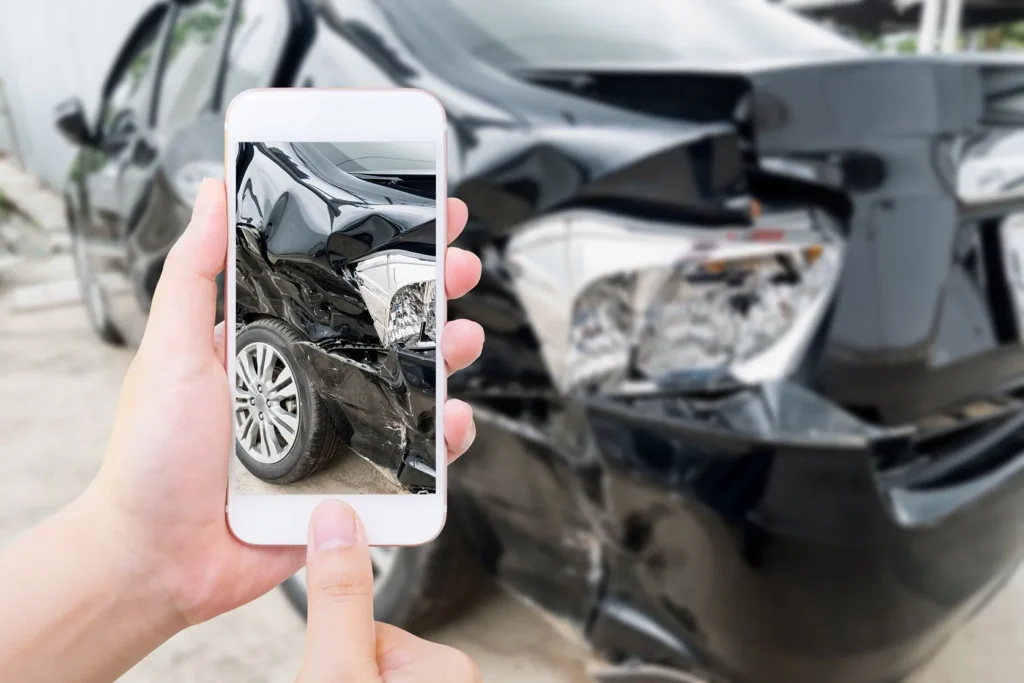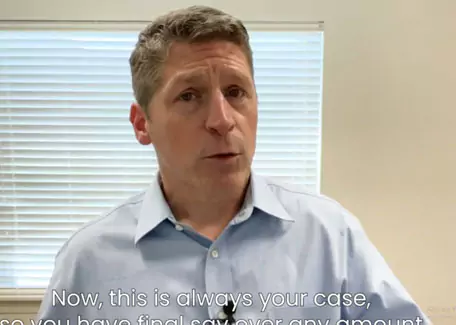Why Is Evidence Important in My Truck Accident Claim?
 After a truck accident, you might feel overwhelmed and unsure about what to do next, especially when it comes to getting compensation for your injuries. Understanding why evidence is important in your truck accident claim is fundamental for building a strong case. Evidence includes all the information and documents that support your version of what happened. This can be anything from police reports and medical records to eyewitness statements and photos of the accident scene. For example, if a truck driver ran a red light and caused a crash, evidence like traffic camera footage or witness statements is vital to prove the truck driver’s negligence.
After a truck accident, you might feel overwhelmed and unsure about what to do next, especially when it comes to getting compensation for your injuries. Understanding why evidence is important in your truck accident claim is fundamental for building a strong case. Evidence includes all the information and documents that support your version of what happened. This can be anything from police reports and medical records to eyewitness statements and photos of the accident scene. For example, if a truck driver ran a red light and caused a crash, evidence like traffic camera footage or witness statements is vital to prove the truck driver’s negligence.At Big River Trial Attorneys, we understand the challenges of gathering and presenting evidence effectively. Our team is here to help you through this process, making sure your claim is as strong as possible. We offer free consultations to discuss your case and explore your options. Don’t go through this difficult process alone; contact us today at 225-725-6000. Let us help you get the compensation you deserve.
The Role of Evidence in Truck Accident Claims
After a truck accident, having evidence is essential to proving who is at fault and getting compensation. The success of a truck accident claim largely depends on the evidence you present, which shows what happened before and after the crash. Without strong evidence, it becomes much harder to prove who caused the accident, and insurance companies may not offer fair compensation.
To prove negligence in a truck accident case, follow these steps:
- Duty of Care: Establish that the truck driver or trucking company has a legal obligation to ensure safety on the road.
- Breach of Duty: Demonstrate that the truck driver or company failed to uphold their duty of care, such as by violating traffic laws or neglecting vehicle maintenance.
- Causation: Show a direct link between the breach of duty and the accident, proving that the negligence directly caused the crash and resulting injuries.
- Damages: Provide evidence of the injuries and losses suffered due to the accident, including medical expenses, lost wages, and other related damages.
Evidence is necessary to prove each of these elements. For example, a police report might show that the truck driver was speeding, which is a breach of their duty of care. Medical records can link your injuries directly to the accident, proving causation and damages. Together, these pieces of evidence help establish negligence and secure the compensation you deserve.
Accident victims often face challenges in gathering evidence due to the immediate chaos following a crash. Trucking companies are known to aggressively defend against accident claims, making it harder to collect evidence. Because the trucking industry is competitive, these companies and their insurance providers use significant resources to reduce their liability.
At Big River Trial Attorneys, we understand these challenges and are committed to helping you gather the necessary evidence to support your truck accident claim. Our seasoned team is skilled at navigating the complexities of evidence collection, ensuring that no stone is left unturned in building a strong case. We work diligently to counter the aggressive tactics of trucking companies, providing you with the best chance of securing the compensation you deserve.
Types of Evidence Needed for a Strong Truck Accident Case
 Gathering evidence directly from the accident scene is crucial for strengthening a truck accident claim. Key evidence includes police reports, medical records, eyewitness statements, and photos or videos of the scene. Each piece of evidence helps build a clear picture of the accident and prove negligence by the truck driver or trucking company.
Gathering evidence directly from the accident scene is crucial for strengthening a truck accident claim. Key evidence includes police reports, medical records, eyewitness statements, and photos or videos of the scene. Each piece of evidence helps build a clear picture of the accident and prove negligence by the truck driver or trucking company.
Collecting evidence at the accident scene is vital. It can include physical evidence like vehicle debris and skid marks, along with documents such as police reports and witness statements. To prove negligence in truck accidents, you need to show duty of care, breach of that duty, causation, and resulting damages. Each type of evidence helps establish these elements, making the claim stronger.
Importance of Police Reports
Police reports are foundational in truck accident claims. They provide an unbiased account of the accident, detailing what happened, who was involved, and the initial findings by the officers. This report usually includes important information like insurance details and the identity of all parties involved, which is essential for determining liability.
Police accident reports often have witness statements, crash scene diagrams, and photographs, all supporting other evidence. These details help create a full picture of the accident, making the police report a key piece of evidence. Getting the police report is a critical step in gathering evidence and proving negligence.
Role of Medical Records
Medical records are essential as they document the injuries from a truck accident. They show the link between the accident and your injuries, detailing how it has affected your life. These records are vital for proving the extent of injuries and their direct connection to the accident, making them indispensable in any truck accident claim.
Getting medical treatment soon after the accident helps establish this link, aiding in evidence preservation and ensuring accurate medical records. These records provide compelling evidence that can significantly impact the outcome of a truck accident claim.
Eyewitness Statements
Eyewitness statements offer additional insights into the events before and after the accident. They provide independent perspectives that might not be captured in other evidence. These statements are valuable as they can confirm other evidence, like police reports and medical records, strengthening the claim.
Eyewitness statements are important because they offer unbiased perspectives that can support the victim’s account. Their observations help establish the sequence of events and the truck driver’s actions, which are essential for proving negligence. Collecting these statements promptly ensures their accuracy and reliability.
Photographs and Videos from the Scene
 Photos and videos are powerful tools for proving negligence and understanding the accident’s circumstances. Pictures and videos of the scene, including vehicle damage and road conditions, are crucial for supporting claims. This evidence clearly documents the scene, showing details like vehicle positions and road conditions that can significantly influence the outcome of a truck accident claim.
Photos and videos are powerful tools for proving negligence and understanding the accident’s circumstances. Pictures and videos of the scene, including vehicle damage and road conditions, are crucial for supporting claims. This evidence clearly documents the scene, showing details like vehicle positions and road conditions that can significantly influence the outcome of a truck accident claim.
Visual evidence provides a clear view of the accident, highlighting critical aspects like skid marks, vehicle debris, and the extent of vehicle damage. This evidence supports other types and helps prove negligence, illustrating the accident’s severity. Quickly collecting photos and videos from the accident scene is essential to preserve their accuracy and relevance.
Can Social Media Posts Be Used as Evidence in My Case?
Social media posts can be important in truck accident claims today. Platforms like Facebook, Instagram, and Twitter may hold posts, photos, or videos that offer insights into an accident. These might capture the accident scene, the truck driver’s behavior, or eyewitness accounts, serving as valuable evidence.
However, using social media evidence requires caution. Ensure the content is genuine and unaltered. Privacy settings can affect whether posts are allowed in court. A skilled truck accident attorney can guide you through these issues to use social media evidence effectively.
Be careful with your social media posts after an accident. Insurance companies and opposing lawyers may scrutinize posts about your injuries or activities. Discussing your social media use with your attorney can help protect your claim and strengthen your case.
Specialized Evidence in Truck Accident Cases
Establishing negligence in truck accidents often depends on specific evidence unique to these cases, such as black box data, truck maintenance records, and driver logs. Each type of evidence plays a critical role in showing what the truck driver did and whether the trucking company followed safety standards.
Accident reconstruction experts examine this evidence to understand the crash dynamics and determine who is at fault. Their insights are vital for understanding how the accident happened and identifying the responsible party. Using this specialized evidence and expert analysis strengthens your case to prove negligence and secure compensation.
Black Box Data
Black box data from trucks is essential for determining negligence and liability. It provides key information about the truck’s speed, direction, and driver behavior just before the accident. This data gives a detailed account of how the truck was operating before the crash, which is invaluable for proving negligence and understanding the truck driver’s actions at the time of the accident.
Obtaining black box data can be complex and is usually handled by an attorney. This data often includes additional details about the truck’s operation and condition, which can support the case by showing mechanical issues or driver mistakes.
Analyzing black box data allows attorneys to build a strong case that highlights the truck driver or company’s negligence.
Truck Maintenance and Inspection Records
Collecting maintenance and inspection records is helpful for showing the trucking company’s negligence in maintaining vehicle safety. These records help prove mechanical failures and demonstrate if the truck was properly maintained and inspected regularly. Poor maintenance can lead to mechanical failures and accidents, making these records essential in a truck accident claim.
The trucking company’s policies on hiring, training, and maintenance should ensure only qualified individuals drive and that trucks are well-maintained. Failure to follow these policies can indicate liability in a truck accident case.
Accessing these records can reveal the driver’s qualifications and any negligence that may have contributed to the accident. Combining maintenance records with company policies can be instrumental in a truck accident claim, highlighting both mechanical neglect and potential company liability.
Driver Logs and Hours of Service Compliance
Driver logs can help identify if there were violations in hours of service and rest periods. Accurate logs show whether a driver was overworked, which might have contributed to an accident. These logs are essential for proving adherence to federal regulations and traffic laws designed to prevent fatigue and ensure road safety.
Analyzing driver logs allows attorneys to spot discrepancies or violations that suggest negligence by the trucking company or driver. This evidence is vital for building a strong case and showing the truck driver’s actions leading up to the accident.
Compliance with hours of service regulations is key for proving negligence and securing compensation in a truck accident claim.
Legal Timeframes and Evidence Preservation
Preserving evidence is essential to prevent trucking companies from altering or destroying data. Legal processes have strict deadlines, making it vital to secure evidence early for a strong case. Surveillance footage can automatically overwrite, so it’s important to act quickly to save it. Witness memories fade over time, so conducting interviews promptly helps capture accurate details.
Physical evidence at the accident scene, like skid marks and debris, can be affected by weather or cleanup efforts, so it’s important to document them quickly. Electronic data from the truck, such as black box information, must be preserved immediately to avoid losing it.
Trucking companies’ record-keeping can show negligence if they don’t follow legal rules. Collecting and preserving all evidence within legal timeframes is key to building a strong truck accident case.
What Happens to Evidence Once the Statute of Limitations Expires?
Once the statute of limitations expires in a truck accident claim, you lose the chance to take legal action and use your evidence in court. The statute of limitations is the deadline for filing your claim. If you miss this deadline, your evidence might become useless legally. In Louisiana, you have one year from the accident date to file a truck accident claim. If you don’t file within this time, you can’t seek compensation in court, no matter how strong your evidence is.
When the statute of limitations runs out, keeping evidence can become difficult. Trucking companies and other involved parties are no longer required to keep records related to the accident. This may lead to the loss or destruction of evidence like black box data, maintenance records, and driver logs, which are key to proving negligence and liability.
That’s why it’s important to act quickly and speak with an experienced truck accident attorney soon after the accident. They can help you navigate the legal process, ensure evidence is preserved within the legal timeframe, and file your claim before the statute of limitations expires. Doing this protects your right to compensation and holds the responsible parties accountable.
How Evidence Affects Compensation in Truck Accident Claims
In truck accident claims, the amount and quality of evidence play a fundamental role in determining the compensation victims receive. Preserving strong evidence can lead to better settlement offers and results in court. The more detailed and solid the evidence, the stronger your case for covering medical expenses, lost wages, and other damages.
Trucking companies and insurers often fight claims to reduce their payouts, so having strong evidence is vital. Proving fault in complex truck accident cases relies on having enough evidence, which is crucial for getting compensation. Every piece of evidence, from police reports to black box data, is important in maximizing compensation for victims.
By showing the truck driver’s actions, the truck’s condition, and the accident details, evidence helps prove negligence and establish who is liable. This directly influences the compensation amount, ensuring accident victims get the financial support they need to recover and move on.
Why You Need an Experienced Truck Accident Attorney
 An experienced truck accident attorney can manage all the legal work and gather the necessary evidence to build a strong case. They have the skills to collect evidence that helps determine the value of a truck accident case. A knowledgeable truck accident lawyer knows how to find and secure important evidence, often obtaining it from the trucking company.
An experienced truck accident attorney can manage all the legal work and gather the necessary evidence to build a strong case. They have the skills to collect evidence that helps determine the value of a truck accident case. A knowledgeable truck accident lawyer knows how to find and secure important evidence, often obtaining it from the trucking company.
Truck accidents usually involve companies with legal teams trying to reduce their liability, so having an attorney on your side is essential. Contacting an attorney quickly after a truck accident increases your chances of building a strong case and getting the compensation you deserve. They understand the legal system’s complexities and ensure all evidence is preserved and presented effectively.
Attorneys handle negotiations with insurance and trucking companies, working to get the maximum compensation for accident victims. Their knowledge and resources are fundamental in overcoming aggressive defense tactics and ensuring that victims receive the justice they deserve.
How Big River Trial Attorneys Can Help You
At Big River Trial Attorneys, we are dedicated to helping our clients with their truck accident claims by providing personal attention and a clear strategy. Our team has extensive experience in handling truck accident cases, ensuring that every detail is covered. We know the federal regulations that affect the trucking industry and use this knowledge to build a strong case for you.
We stand out because we focus on gathering and analyzing evidence thoroughly, which is key to proving who is at fault and getting you the compensation you deserve. We work hard to protect your rights against insurance and trucking companies. We aim to get you the maximum compensation possible, covering all your losses such as medical expenses and lost wages.
Choosing Big River Trial Attorneys means having a team that truly cares about your recovery and future. Let us help you through the legal process and fight for your justice. Contact us today for a free consultation at 225-725-6000. We are here to help you get the compensation you deserve.



